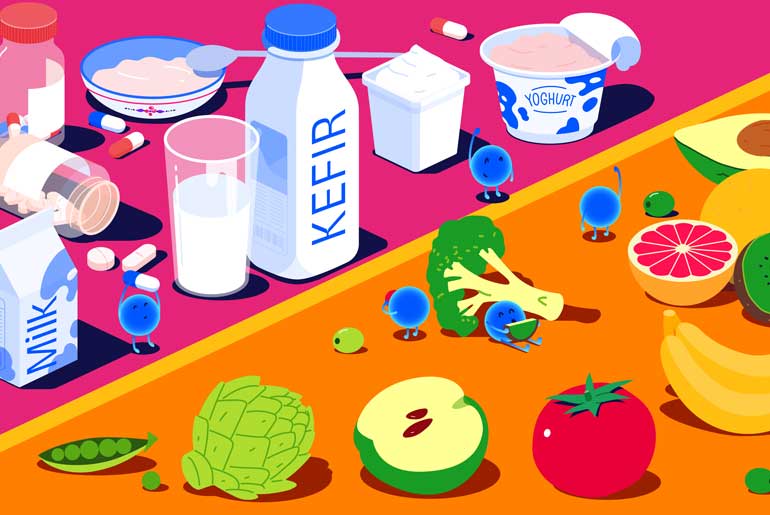You’ve probably heard about “probiotics” and “prebiotics,” which are often marketed as being beneficial for health on food and supplement products containing these ingredients. Probiotics are microorganisms that are commonly found in various foods such as yogurt and kombucha. Prebiotics are components in some foods that act as nutrition for probiotics, according to the International Scientific Association for Probiotics and Prebiotics (ISAPP). Prebiotics and probiotics contain or support microorganisms that may benefit the health of our microbiome — groups of microorganisms (fungi, bacteria, and viruses) that live in a particular part of the body, such as the skin or gastrointestinal tract.
Probiotics:
Probiotics are live microorganisms, often referred to as “good” or “friendly” bacteria, that provide health benefits when consumed in adequate amounts. They are commonly found in fermented foods like yogurt, kefir, sauerkraut, and supplements. Probiotics help maintain a balanced gut microbiota, which is crucial for digestive health, immune function, and may even influence mood and mental health. By outcompeting harmful bacteria and producing substances that inhibit their growth, probiotics can help prevent and treat various gastrointestinal issues, such as diarrhea and irritable bowel syndrome, and support overall well-being.
Sources:
- Fermented Foods: Yogurt, kefir, sauerkraut, kimchi, miso, tempeh, kombucha, and certain cheeses.
- Supplements: Available in various forms, including capsules, tablets, and powders.
Health Benefits:
- Digestive Health: Help balance gut microbiota, aid digestion, improve nutrient absorption, and alleviate conditions like diarrhea, IBS, and IBD.
- Immune Support: Enhance immune function by modulating the gut microbiome, reducing the risk of infections.
- Mental Health: Potential benefits for anxiety, depression, and stress through the gut-brain axis.
- Skin Health: May improve conditions like acne, eczema, and rosacea by maintaining healthy skin microbiota.
Prebiotics:
Prebiotics are non-digestible food components that promote the growth and activity of beneficial bacteria in the gut. They serve as food for probiotics, helping to enhance their effects on gut health. Common prebiotics include fibers like inulin, fructooligosaccharides (FOS), and galactooligosaccharides (GOS), which are found in foods such as garlic, onions, bananas, asparagus, and whole grains. By fostering a favorable environment for probiotics, prebiotics contribute to improved digestion, enhanced immune function, and overall well-being. They play a crucial role in maintaining a healthy balance of gut microbiota, which is essential for various aspects of health.
Sources:
- Plant-Based Foods: Onions, garlic, leeks, asparagus, bananas, oats, apples, chicory root, Jerusalem artichokes, and flaxseeds.
- Supplements: Available in various forms, often included in synbiotic supplements (combined with probiotics).
Health Benefits:
- Gut Health: Promote the growth of beneficial bacteria, maintaining a healthy gut microbiome.
- Digestive Function: Improve bowel regularity and reduce constipation.
- Immune Support: Enhance immune function and reduce the risk of infections and inflammatory conditions.
- Metabolic Health: Help regulate blood sugar levels, improve insulin sensitivity, and support weight management.
- Bone Health: Enhance mineral absorption, particularly calcium and magnesium, supporting bone health and reducing the risk of osteoporosis.
Synergy between probiotics and prebiotics:
The synergy between probiotics and prebiotics, often referred to as synbiotics, enhances the health benefits of both. Probiotics are live beneficial bacteria that improve gut health, while prebiotics are non-digestible fibers that nourish these probiotics. When combined, prebiotics serve as food for the probiotics, promoting their growth and activity. This synergistic relationship helps maintain a healthy balance of gut microbiota, which is essential for digestion, immune function, and overall health. Synbiotics can be found in various foods and supplements, offering a comprehensive approach to supporting a healthy microbiome and maximizing the positive impacts on the gastrointestinal system and beyond.
Incorporating Probiotics and Prebiotics into Your Diet
Incorporating probiotics and prebiotics into your diet is essential for maintaining a healthy gut microbiome and overall well-being. Here are some practical tips for including these beneficial substances in your daily eating habits:
1. Probiotics:
- Include Fermented Foods: Incorporate probiotic-rich fermented foods into your meals, such as yogurt, kefir, sauerkraut, kimchi, miso, tempeh, and kombucha. Enjoy these foods as snacks, condiments, or side dishes to add variety and flavor to your meals.
- Choose Probiotic Supplements: Consider taking high-quality probiotic supplements if you have difficulty obtaining enough probiotics from food sources. Select supplements that contain a variety of probiotic strains and adequate colony-forming units (CFUs) to ensure effectiveness.
- Be Mindful of Processing: Opt for minimally processed fermented foods to preserve the live cultures. Look for products labeled “live and active cultures” to ensure potency.
2. Prebiotics:
- Incorporate Fiber-Rich Foods: Include a variety of prebiotic-rich foods in your diet, such as onions, garlic, leeks, asparagus, bananas, oats, apples, chicory root, Jerusalem artichokes, and flaxseeds. Add these foods to salads, soups, stir-fries, smoothies, and other dishes to increase your fiber intake.
- Whole Grains and Legumes: Incorporate whole grains like oats, barley, quinoa, and brown rice, as well as legumes such as lentils, chickpeas, beans, and peas, which are rich in prebiotic fibers. Use whole grains and legumes as the base for meals or snacks, such as salads, grain bowls, soups, and stews.
- Snack on Fruits and Vegetables: Enjoy fruits and vegetables with edible skins or peels, as they contain soluble and insoluble fibers that act as prebiotics. Examples include apples, pears, berries, carrots, and cucumbers. Snack on raw fruits and vegetables or incorporate them into meals, snacks, and desserts for added fiber and prebiotics.
3. Combined Approach:
- Choose Synbiotic Foods: Look for synbiotic foods that contain both probiotics and prebiotics, offering a synergistic combination of beneficial microorganisms and nourishing fibers. Examples include certain yogurt brands that contain added prebiotic fibers or fermented foods with naturally occurring prebiotic components.
- Experiment with Recipes: Get creative in the kitchen by experimenting with recipes that incorporate probiotic and prebiotic ingredients. Try making homemade yogurt, fermented vegetables, kefir smoothies, overnight oats with fruit and flaxseeds, or bean-based salads with onions and garlic.
- Consistency is Key: Aim to consume probiotic and prebiotic foods regularly as part of a balanced diet to support a diverse and thriving gut microbiome. Incorporate these foods into your meals and snacks consistently to reap the long-term health benefits.
By incorporating probiotic and prebiotic-rich foods into your daily diet, you can support digestive health, enhance immune function, and promote overall well-being. Experiment with different foods, recipes, and meal combinations to find what works best for you and enjoy the delicious and nutritious benefits of a gut-friendly diet.
Conclusion:
In conclusion, probiotics and prebiotics play crucial roles in promoting gut health, bolstering immune function, and fostering overall well-being. By incorporating these beneficial microorganisms and fibers into your diet through foods or supplements, you can optimize your health. Understanding their sources and benefits empowers you to make informed choices for your well-being. Consulting with a healthcare professional can provide personalized guidance on selecting the right probiotics and prebiotics to address your specific health needs. Embracing these dietary additions can lead to a healthier gut microbiome and a happier, healthier you.
Disclaimer:
The information contained in this article is for educational and informational purposes only and is not intended as a health advice. We would ask you to consult a qualified professional or medical expert to gain additional knowledge before you choose to consume any product or perform any exercise.








